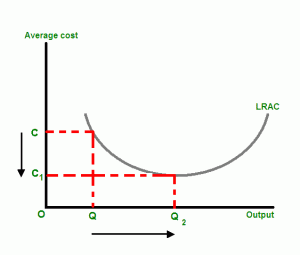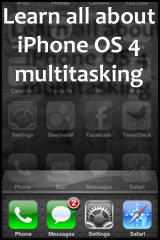Economy of scale
by Justin Horn on Jun 17th, 2010 @ 1:06 pmFrom Wikipedia:
Economies of scale, in microeconomics, are the cost advantages that a business obtains due to expansion. They are factors that cause a producer’s average cost per unit to fall as scale is increased.
These three words sum up why we will not see a Verizon iPhone until 4G LTE is a reality.
Before we get into economies of scale, just think about how many hours of R&D go into the development of the iPhone every year. To make a custom iPhone for one carrier, in one country, seems like a wasted expense. Don’t get me wrong, I’m sure they have looked at or even done some limited R&D on what it would take to get a CDMA iPhone out the door, but it’s not a main focus.
Take the R&D expense out of the equation and the Verizon iPhone still doesn’t make sense. As Apple’s manufacturing partners ramp up production of the iPhone, the cost per unit is going to drop and Apple’s profit will go up.Why would they want to have a production line just for Verizon? Verizon is a huge company, but compared to AT&T and the rest of the world, they aren’t. They would have to make far fewer CDMA iPhones raising the average cost and cutting into their profits.
Continued from Wikipedia on Economies of scale:
Economies of scale may be utilized by any size firm expanding its scale of operation. The common ones are purchasing (bulk buying of materials through long-term contracts), managerial (increasing the specialization of managers), financial (obtaining lower-interest charges when borrowing from banks and having access to a greater range of financial instruments), and marketing (spreading the cost of advertising over a greater range of output in media markets).
I highlighted purchasing and marketing as these are the main factors that would influence Apple. They’ve put strains on world supplies of flash chips due to the huge production of their latest iDevices, so we know they can get some bulk buying discounts. To build the Verizon iPhone they would need to purchase CDMA chips on a much smaller scale increasing their cost. The marketing might overlap a bit, but they would need to tweak ads to make sure they didn’t advertise a feature, like talk and surf, as Verizon’s CDMA network can’t support this.
Go beyond the cost of the manufacturing and think about supporting the phone. This is one reason why Apple only makes one iPhone per year, compared to Motorola’s and Nokia’s hundreds.
What about that special Chinese iPhone? In this case all Apple had to do was disable WI-FI. I’m not an Apple engineer, but common sense tells me disabling a feature is monumentally easier than swapping out the main radio chip that makes up the phone part of iPhone. I’m betting the WI-FI chips are still in there and disabled via the hardware. As for support, it’s the same phone with one featured disabled, so one less thing to break.
What about AT&T’s generous early upgrade policy this year? You’ll remember last year they did almost the same thing, but only extened the upgrade elgible window through September. This year they only exteneded it an additional 3 months. The other difference this year is AT&T raised the ETF from $175 to $350 on all their smartphones, matching Verizon’s somewhat recent ETF rate hike. I know some make a case that these two events mean they are trying to get more people hooked on AT&T with a bigger penalty for leaving. It’s very logical argument, but I just think they raised the ETF to match Verizon and are offering the early upgrade to iPhone owners for the same reasons as last year.
We will see an iPhone on Verizon when Verizon is on the same wireless network technology as the rest of the world. This will happen when everyone goes to the 4G LTE networks. When the 4G network will be deployed on a large scale is another question. I’ve heard rumors of 2011, but something tells me we are still a 2-3 years away.
Follow me on Twitter @justin_horn
View 2 Comments
Featured post, iPhone, iPhone 4, Verizon
Recent Post
- More details on the iPad mini new multitouch feature
- iPad Mini predictions
- Zune still the butt of jokes, this time on the Simpsons
- AT&T LTE No Service: Too many LTE iPhone 5 users?
- iPhone 5 cellular usage while on WIFI bug affects AT&T users as well
- Tim Cook responds to iOS 6 Map app issues in public letter
- iPhone 5 screen vs iPhone 4: Really close up
- iPhone 5 line at 5th Ave Apple Store (Updated 11PM)
Featured Post
Comments
Sorry, the comment form is closed at this time.




[...] rumors all the time. Yes, eventually Verizon will get one, but not yet. I explain why I think this here and [...]
[...] until LTE. I argued Apple would stick to making one phone per year, to keep cost down, in my post Economy of Scale. I thought, why would they go to all the trouble to make a special phone just to support Verizon? [...]